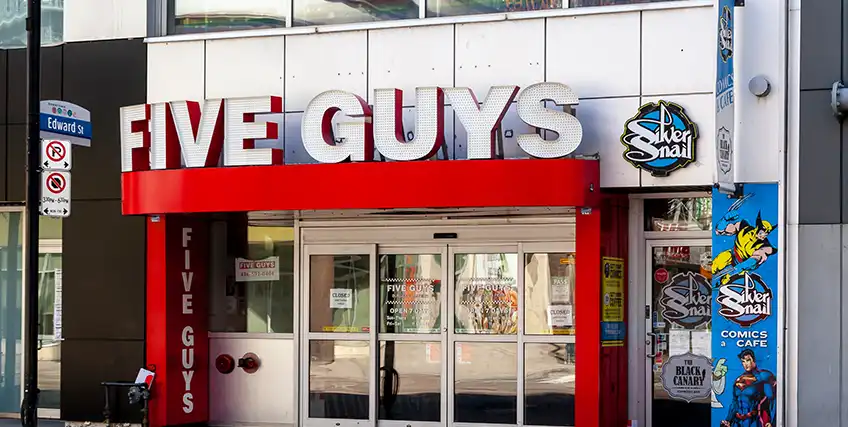An In-Depth Look at Franchise Financing Options
February 27, 2025 | Last Updated on: February 27, 2025

Opening a franchise requires a lot of upfront working capital, but don’t let that dissuade you from your entrepreneurial ambitions of being a business owner with a proven brand. Franchise financing options are available and many successful franchise owners have gotten their start by borrowing enough to get going. In this article, we cover all the important things to know before you jump into the world of franchise financing options.
What Does it Cost to Start a Franchise?
First and foremost, what does it actually cost to start a franchise? Just like any other brick-and-mortar business, starting a franchise will include real estate, equipment, and inventory expenses. But there’s more for franchisees. Most companies charge an upfront “franchise fee” to start your franchise, either paid in a lump sum or installments. For example, McDonald’s charges $45,000. You’ll also be responsible for royalty and advertising fees. Usually, this will be a percentage of your sales.
For a full breakdown of every company’s franchise fee, you can refer to the Franchise Disclosure Document (FDD). The Federal Trade Commission requires companies to give an FDD to all prospective franchisees at least two weeks before signing any franchise agreements. Everything you need will be in this document, from franchising fees to potential franchise financing options.
Lowering the Cost of Your Franchise
Reducing the initial investment required for a franchise can make ownership more accessible and financially sustainable. By exploring different financing methods, negotiating lease terms, and leveraging available funding programs, franchisees can minimize costs and increase their chances of long-term success. Below are several strategies to help lower the financial burden of starting a franchise.
Equipment Leasing
For some franchises, expensive equipment can be necessary to get your shop up and running. Typically, the franchisor will be able to lease the equipment to you, where the equipment serves as collateral. If not, you’ll want to seek out a third-party supplier or financial institution who can provide you with the best terms for your equipment or consider buying used equipment, furniture, vehicles, etc. depending on what is allowed by the franchise company. Best franchise financing solutions often include equipment financing to ease the burden of upfront costs.
Landlords & Rent
There are numerous concessions you can negotiate with your landlord from tenant improvement allowances to reduced rent. As always, you’ll want to hire a lawyer to check over your lease agreement before you put pen to paper. It might cost a bit more up front but it could save you thousands down the road. Some franchisors will offer help to franchisees in sourcing their lease in order to secure the best possible deal.
Franchisor Financing
Check Item 10 of the FDD to see if your franchisor offers franchise financing options or if they work with a specific affiliate to assist in funding and speed up your opening time. More and more franchises are offering franchise loan programs to combat tight lending environments and to facilitate more openings. Some franchisors will even help guarantee or take on a portion of the responsibility for payment in the case of a default. Given the tight lending environment at big banks, some franchises have even started offering discounted or deferred franchise fees or even refunded franchise fees if financing can’t be secured.
Exploring the Best Franchise Financing Options
Once you have created a detailed franchise business plan, finding the right business financing is one of the crucial steps in franchise ownership. There are various franchise financing options, however, understanding the pros and cons of them can help you make an informed decision. Let’s explore all the funding options for your franchise brand.
U.S. Small Business Administration (SBA) Loan
About 10% of all SBA loans go towards franchise financing SBA programs. The SBA’s programs serve to guarantee all or a portion of loans for an intermediary lender, an institution that facilitates the channeling of funds between lenders and borrowers indirectly, to remove some of the risk and make it much more likely that they will be willing to work with small business owners. Through the SBA7(a) and SBA 504 programs, franchisees can possibly qualify for a low-interest commercial bank loan or loans through alternative lenders that would otherwise not be available. The SBA is a great option for first-time franchisees, as the SBA fills in the credibility gap that you would otherwise have when trying to obtain traditional bank loans on your own. And your loans will have regulated maximums because your interest rate is controlled proportionally to the prime rate capped by the federal government.
However, the only downside to the SBA is the lengthy application process and long wait times for loan approvals. to receive the funds. Borrowers can wait up to several months without receiving a decision. If you’re itching to open the doors to your new franchise sooner than that, you can also work with a financing provider who can provide a bridge loan or other type of short-term financing. Many of these will even help you secure an SBA loan so you can spend time focusing on running your business.
Rollovers as Business Startups (ROBS) for Franchises
Have a 401(k) or another type of retirement fund? Using your retirement fund as a franchise financing option may be your best bet. In order to do so, you’ll need to create a C corporation that can be used to buy stock in your new franchise business without having to pay taxes or an early withdrawal penalty. A ROBS is not a loan, so you won’t be subject to debt or interest that you need to pay back. You’ll be able to conserve more of your income to help your business be successful in the long run and reinvest.
Despite the benefits to a ROBS, there are a few drawbacks. You need to be hypervigilant regarding the current IRS rules for these ROBS plans as they have recently come under scrutiny. And certain retirement accounts, such as Roth IRAs, are not eligible for a ROBS. Given that you’re using a retirement account as a franchise funding option, this also isn’t usually a good option for young people who haven’t had a chance to build up their retirement accounts. And if your franchise fails, you could lose all your retirement funds, so it’s a decision you should consider very carefully with the help of a financial advisor.
Crowdfunding Financing
Crowdfunding is a new and creative way to try and obtain financing for your franchise. Typically, this is reserved for when your franchise doesn’t offer financing, and bank, SBA, and online lenders don’t pan out. This is a great option for potential franchisees with one or more blemishes in their financial history and can always be used as a backup if the loans and interest rates you are being quoted for are unreasonable.
Home Equity Line of Credit (HELOC)
Comfortable with using your personal home as collateral for your new business? If you have at least 20-30% equity in your home, a HELOC could be a great way for franchise financing option as it offers low interest. You’ll get access to a lump sum of cash immediately, and just like a normal business line of credit, you will only pay interest on what you’re using. Again, this is another option that comes with a lot of risk and should be considered carefully. If you’re married, for instance, you’ll want to talk this option through with your spouse.
Loans from Friends and Family
While not necessarily recommended in all cases, one of the more common ways to get financing to start a business is through friends and family. Despite the favorable terms and the ability to structure the deal to your liking and with no specific requirements, there is always the possibility these types of loans can cost you a lot more than just money. A loss of friendships and family is a real possibility when entering into an agreement like this. Issues ranging from a lack of clarity to tax issues and strained social relationships are all downsides to friends and family loans.
If you do decide to go the friends and family route, the single most important thing you must do is draft up a specific contract that details repayment terms and exact expectations. Making sure that everything is written down can avoid unfortunate confrontations, legal or otherwise, later on down the road.
Final Thoughts
Opening a franchise is one of the best ways to get your entrepreneurial feet wet. It allows you to hit the ground running with a known brand name and takes out some of the difficulties more traditional entrepreneurs face. However, just like any business, franchises are capital intensive and require upfront cash. Make sure to do your research on all of the possible franchise financing options so you can choose the one that makes the most sense for your personal financial situation in both the short-run and long-run.
Frequently Asked Questions About Franchise Financing Options
What are the most common franchise financing options?
Franchise financing options include SBA loans, franchisor financing, equipment leasing, home equity lines of credit (HELOC), crowdfunding, and Rollovers as Business Startups (ROBS). The right choice depends on your financial situation and business goals.
How do SBA loans help with franchise funding options?
SBA loans, such as the 7(a) and 504 programs, offer low-interest franchise financing options for franchisees. These loans reduce lender risk, making it easier for franchise owners to secure funding with competitive terms.
What is franchisor financing, and how does it work?
Franchisors often provide direct franchise financing options or work with affiliate lenders to help franchisees cover startup costs. Check Item 10 of the FDD to see if your franchisor offers funding assistance or special loan programs.
Is it possible to lower the cost of starting a franchise?
Yes, franchisees can lower costs by negotiating lease agreements, opting for equipment leasing instead of purchasing, and exploring franchisor financing options that offer discounted fees or deferred payments.
Can I use my retirement savings to finance a franchise?
Yes, through Rollovers as Business Startups (ROBS), you can use retirement funds to invest in your franchise without tax penalties. However, this franchise financing option carries risks, including potential loss of retirement savings if the business fails.




